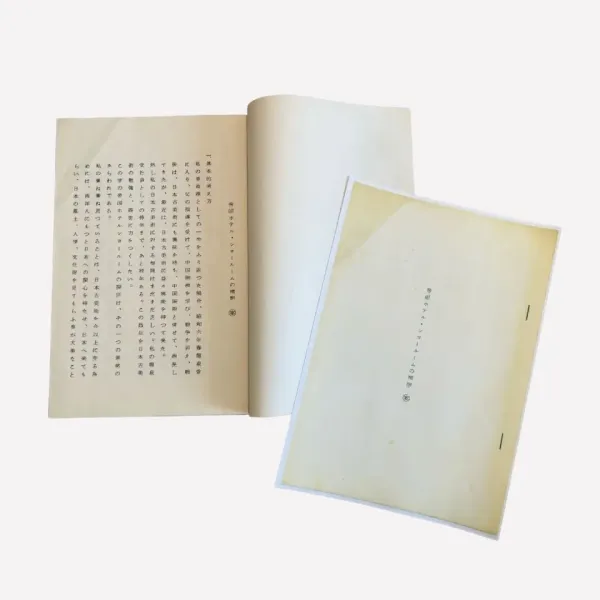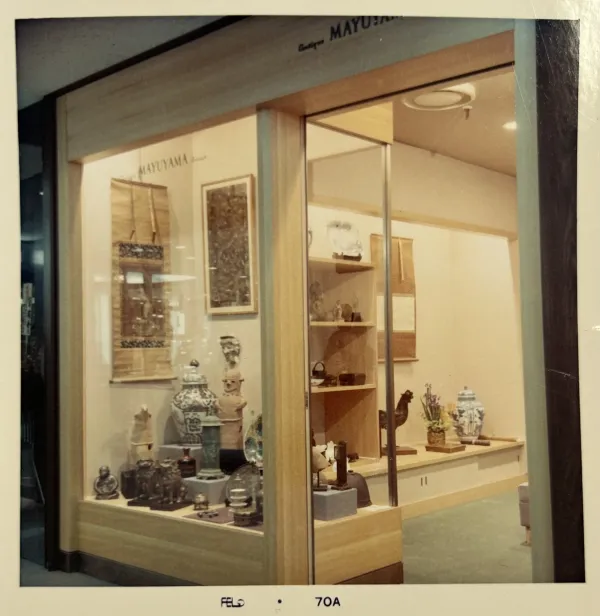In March, 1970 (Showa 45), work was completed on the newly rebuilt Imperial Hotel in Tokyo’s Uchisaiwaichō district and the hotel opened for business. Mayuyama Junkichi opened a Japanese antique art shop in the hotel’s ornate shopping arcade. At the time, Junkichi was 56 years old. This shop was to become the focal point of his plan to offer Japanese paintings, sculpture, and decorative arts amid the period’s burgeoning understanding and interest in these art forms.
After World War II, Junkichi spent the 50s and 60s building his connections to Western museums and collectors. Among those interactions, he developed the firm conviction that his role was to spread the word of Japanese art to a broader audience overseas, not just among specialists. His earlier experience of the viewpoint of people from other countries helped him develop his approach as an antique art dealer responding to overseas demand. He thus proceeded with plans for the realization of his idea. I think that, looking back, the timing of the reopening of the splendid hotel was fated. He gathered Japanese art works as the products to sell in his Imperial Hotel arcade shop. He also developed the idea of returning to his origins by focusing his main antique Chinese ceramics business on highly specialized works and clientele.
Opening a shop in the arcade of the new building of Japan’s major international hotel was a great honor. The energetic sense of anticipation of that period is recorded in Junkichi’s pamphlet, Imperial Hotel Showroom Concept (Draft).

“When I look back over my life as an art dealer, I entered Mayuyama Ryusendo in the spring of 1931 where I was trained by my father and studied Chinese ceramics and then endured the war years. In the post-World War II era, I also developed an interest in Japanese art and began carrying it alongside the Chinese ceramics in our shop. My interest in Japanese art has grown ever more in recent years.
However, I am still learning about antique Japanese art. I have only a few years left before I retire from my work as a Mayuyama Ryusendo employee. During these few years, I hope to study antique Japanese art and work hard on increasing gallery sales.
The opening of the Imperial Hotel Showroom is one expression of that intention.
I have also come to the realization that in order to increase sales of antique Japanese art we must strive to increase an interest in Japan among Westerners. It is extremely important that people come to Japan and personally experience the climate and conditions in Japan, its people, and its cultural heritage.
Just as you teach children by breaking things into small bits, one must approach Japanese art in the same way. Introduce them to the Tokyo National Museum. Take them to see the Hatakeyama Memorial Museum of Fine Art. As has been done in the past, prepare books on antique Japanese art that are easily understood by Western readers. At the same time, show them fine art works. Thus, one must make an effort.
Even if immediate results are not evident, this type of activity will broaden the base number of Westerners interested in antique Japanese art. I believe that it will make dealing in antique Japanese art all the more effective in the coming years and decades. (…)
In addition to selling goods, also provide information to antique art lovers who visit Japan from overseas. In other words, offer advice on how to visit cultural heritage sites in Nara and Kyoto, provide information on books related to antique arts, and introduce them to other art dealers. When they visit our shop, it is our common practice to tell them about what exhibitions are currently on display, how to get to those venues, and other such information.
Upon completion, the newly established Imperial Hotel Arcade will become the best in Japan, from its location and fittings to its prestigious quality. No matter what hotel they stay in, first-time visitors to Japan feel comfortable visiting the Imperial Hotel Arcade. (…)"
[Mayuyama Junkichi, Imperial Hotel Showroom Concept (Draft) 1968]

Mayuyama Junkichi opened a Japanese antique art shop in the hotel’s ornate shopping arcade. 1970
"It is extremely important that people come to Japan and personally experience the climate and conditions in Japan, its people, and its cultural heritage. "